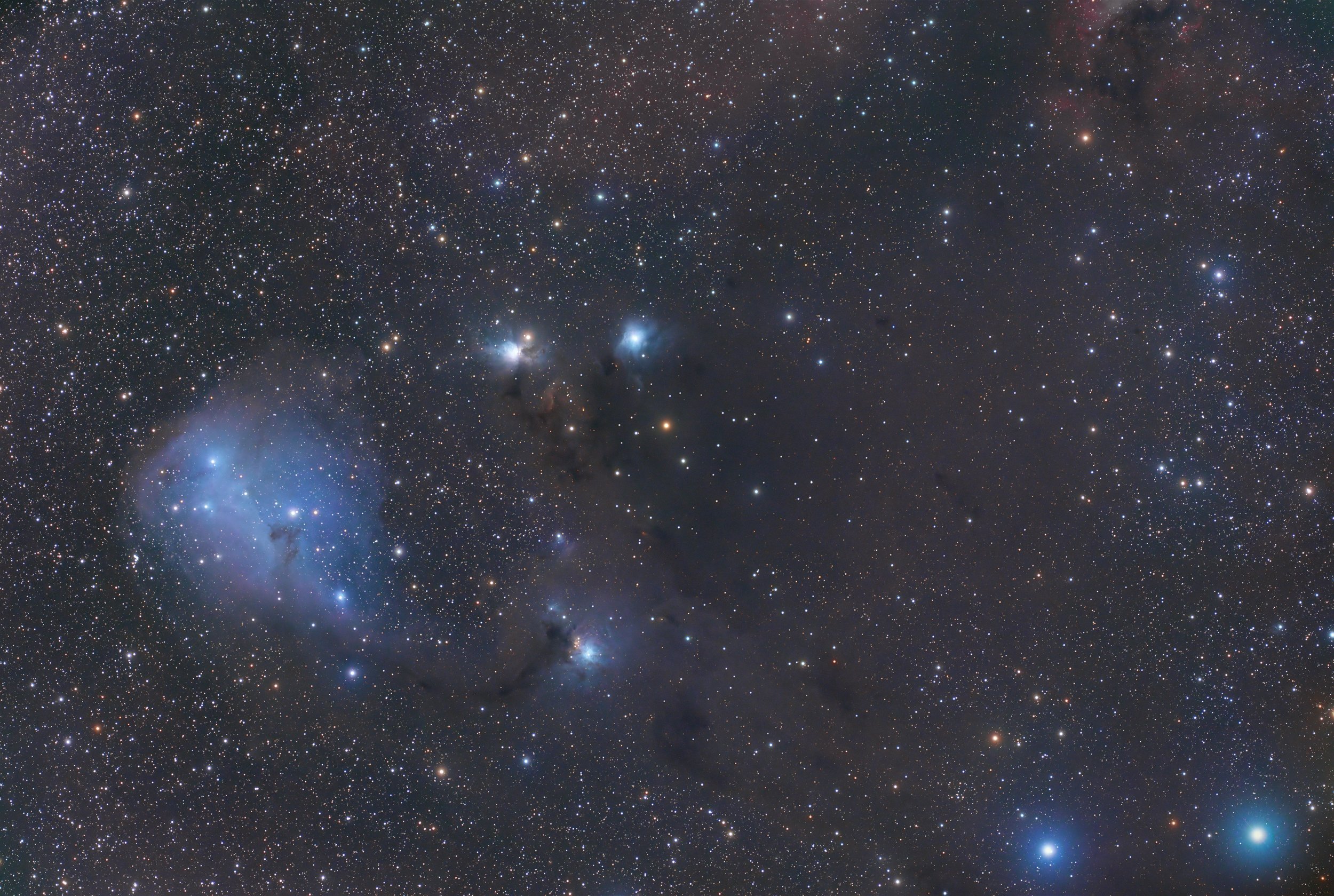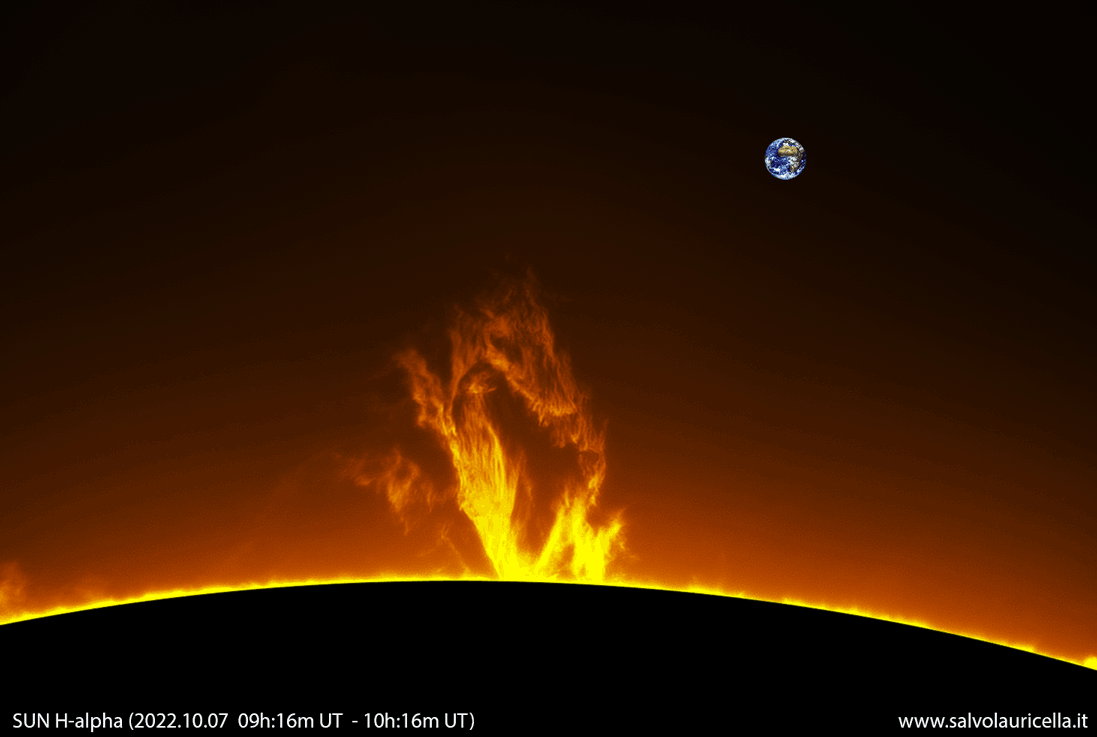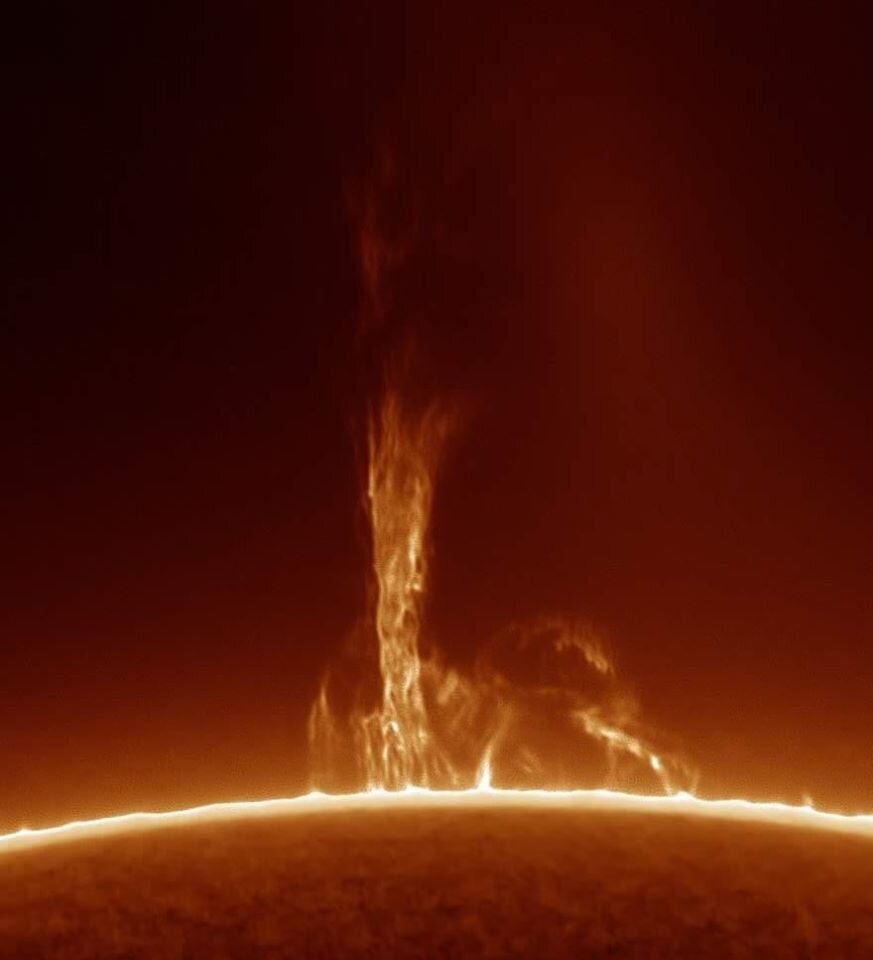
AAPOD2 Image Archives
Loop prominences
On May 13, 2024, an extraordinary solar event was captured, featuring active region AR3664. This sunspot region was responsible for a massive solar storm that generated auroras visible as far south as South Florida. Such displays are exceptionally rare at these latitudes, making the event a significant occurrence for both professional and amateur astronomers.
The image also showcases a beautiful loop prominence, a spectacular feature that was visible using an H-alpha filter. Loop prominences are large, glowing loops of plasma that extend from the Sun's surface, following magnetic field lines. These prominences provide a stunning visual representation of the Sun's magnetic activity and are key to understanding solar dynamics and space weather phenomena.
Prominence evolution
Prominence evolution (07/10/2022) from 09h:16m UT to 10h:16m UT
iOptron CEM70G, Tecnosky APO SLD 130/910, Baader D-ERF 135mm, Daystar Filters Quark Chromosphere, ZWO ASI174MM
Copyright: Salvo Lauricella
Sparkles in the Sun
Image Description and Details :
Solar Activity on October 25, 2887,2890, 2886, I was able to capture the large bulge that was had that day, M1.3 class flashes, we are still in the solar shekel number 25, which according to estimates, could last much less than expected , due to the great activity that has been seen, and that was ahead of the forecasts, for now to enjoy these spectacular solar landscapes, at every moment the sun gives us a different view, to capture it!
Copyright: Arturo Buenrostro
1 minute of Sun
Image Description and Details :
This is one of the most active days of the new solar cycle, weeks with clouds and I only had 5 minutes of sun, and of those minutes here it is in a single photo, one minute of its activity, impressive the details and the beauty that it gives us minute by minute the sun, each look through the telescope, is a new sun, we are going to continue enjoying this new solar cycle, and hopefully it will give us more landscapes like this, I hope you like it.
Mount Skywatcher azeq6.
Camera Zwo asi 178mm
Telescope Lunt 60MT/ B1200PT double stack
Capture Software Firecapture (60 second video recording, I chose 70% of the frames)
Dallas, Tx.
Copyright: Arturo Buenrostro
Photosphere and Solar Chromosphere
Image Description and Details:
Photosphere: Meade 60mm ZWO ASI120MM Herschel Prism + Baader Solar Continuum + Optolong UV / IR + ND # 3 Nexstar mount 1000 frames Chromosphere: Crowned PST ZWO ASI120MM Nexstar mount 1000 Frames in Under Exposure and Over Exposure Software: Firecapture + Autostakkert + Registax + Fitsworks + Ps Guillermo Cervantes Mosqueda Altaír Astronomical Observatory Poncitlán Jalisco Mexico
Copyright Information: Guillermo Cervantes Mosqueda
Solar Prominence
Small solar prominence which must be twice the size of the earth.
Orion ED80CF T
Daystar quark chromospere
ASI120MM-s
Copyright: Mathieu Varis
Our Star The Sun
Our star, the sun, is 4,57 billion years old and belongs to the spectral class G2V yellow-orange. She is a so-called yellow dwarf at best age compared to other stars. We will still be approx. Another 4,5 billion years can enjoy her. However, their end will also be our end...
The shot shows the AR2765 sunspot and a protuberance, an ejection of hot gas, on the surface.
Surface Temperature / Surface Temperature:
~ 5700 ℃
Rotation duration / rotation period: 25,4 days
Distance to Earth / Distance to earth: ~ 149,6 million km
Diameter / Diameter: ~ 1,4 million km
Recording data / capture data:
🔭: Lunt LS152 H-alpha
📷: Zwo ASI 120MM mini
🗓: 12.06.2020 17:43 o'clock
👨 💻: Sharpcap, Autostackkert, Photoshop
Copyright: J-N Photography
Flowers blooming in the summer
A solar eruptive prominence as captured on April 28, 2020 with Earth superimposed for a sense of scale.
A solar prominence (also known as a filament when viewed against the solar disk) is a large, bright feature extending outward from the Sun's surface.
Prominences are anchored to the Sun's surface in the photosphere, and extend outwards into the Sun's hot outer atmosphere, called the corona. A prominence forms over timescales of about a day, and stable prominences may persist in the corona for several months, looping hundreds of thousands of miles into space. Scientists are still researching how and why prominences are formed.
Solar Prominence
Capture duration = 51.89 Sec
Captured frames = 590
Capture frame speed = 11 Fps
Camera =The Imaging Source, DMK31AU03.AS
Telescope = LUNT LS100THa PT (Single Stack) / B1800 / Barlow 2X
Copyright: Peter Desypris











